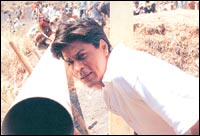 It was disappointing to read that Swades has been met with such a mixed and, at times, scathing critical response. And it was even more disappointing to see that Swades was totally dismissed by the British media. The refusal to review mainstream Indian feature films in many of the British newspapers may come from the rejection of Bollywood as a credible film industry, which is a shame considering Indian cinema produces some of the finest films in the world.
It was disappointing to read that Swades has been met with such a mixed and, at times, scathing critical response. And it was even more disappointing to see that Swades was totally dismissed by the British media. The refusal to review mainstream Indian feature films in many of the British newspapers may come from the rejection of Bollywood as a credible film industry, which is a shame considering Indian cinema produces some of the finest films in the world.
I had been looking forward to Ashutosh Gowariker's next film ever since I was enthralled by the magic of Lagaan, his earlier film. Lagaan succeeded in not only finding an audience abroad but also letting the world know that Indian cinema was capable of producing films as universal in scope and thematic content as Hollywood and other national cinemas. Lagaan, now considered a classic by many Western critics, was a monumental film because it transcended the limitations of mainstream Indian cinema by going forth into a direction in opposition to the populist cinema of the 'masala' film that still dominates Indian cinema today.
| |||||||||||
It would be naive and elitist to take the stance that a film like Swades is a vanity project, a glorified art film from a director who is preoccupied with preaching to the masses. It was an educating process to watch Swades. As I left the theatre, a girl commented upon how it had been a boring experience, and three hours at that.
It would have been snobbish and wrong of me to correct her as the experience and understanding of a film is dependent upon individual interpretation. We love and hate films for different reasons. But one of the negatives of being exposed to Bollywood films like Main Hoon Na and Veer-Zaara is that you become conditioned into responding in a certain way. The demands of an audience can ultimately never be fulfilled as it is not the job of the filmmaker and artists alike to pander to audience expectations, though this is what most films do.
 Personally, I feel Indian audiences are just not ready for a film like Swades.
Personally, I feel Indian audiences are just not ready for a film like Swades.
Swades is a magnificent film held together by a series of episodic allegories, vivid social commentary, strong archetypal characters, a poignant love story and a towering performance by Shah Rukh Khan who manages to show dimensions to his acting that only a director like Gowariker could have been able to extenuate and bring to the foreground.
So what is Swades about?
Primarily, the film is about India today. Ideologically, Swades adopts a liberal position but with a strong nationalist message. Using the concept of the village as a microcosm for contemporary Indian society, the film explores the failure of culture and tradition in embracing the 'new'; the fear and reluctance to embrace technology, the abandonment of responsibilities for materialism and the West and the need for self sustaining independence as exemplified by the audacious sequence in which Mohan Bhargava leads the village into the act of creating electricity from a stream in the surrounding hills.
Unlike Hollywood mainstream films where the emphasis is typically upon the celebration and triumph of the 'individual', a condition of Western capitalism, Swades focuses upon the power and integrity of the collective mass, suggesting that in order for a spirit of co-operation to exist there must be a disintegration of social barriers and ability for self-criticism. Though Mohan may not be a revolutionary on a wider political scale, he is someone who craves purpose and direction in a world that continues to call itself a postmodern global village.
The technological divide and rate of social and economic progression between India and America is vividly emphasised through the electricity Mohan helps to create in India and the space rocket he helps to construct and launch for NASA in the US.
It would be simplistic to reduce Mohan's decision to return to India at the end of the film as idealistic wish fulfillment tied to his need for love. But it has more to do with the horror of anonymity that he fears he will succumb to in America.
His journey through India and back to the village where his surrogate mother is staying is a journey of self-discovery. Ultimately, it is the immediate feelings of 'belonging' to a community that draws him back, providing him with an identity that is firmly rooted in liberal humanism as reinforced by the subtle metaphor of water as a source of life, rebirth and enrichment.
I could go on further about the beauty and intelligence of Swades but I must stop now.
Swades is a step in the right direction for Indian cinema but it seems as though it is a step that may have come too soon.





